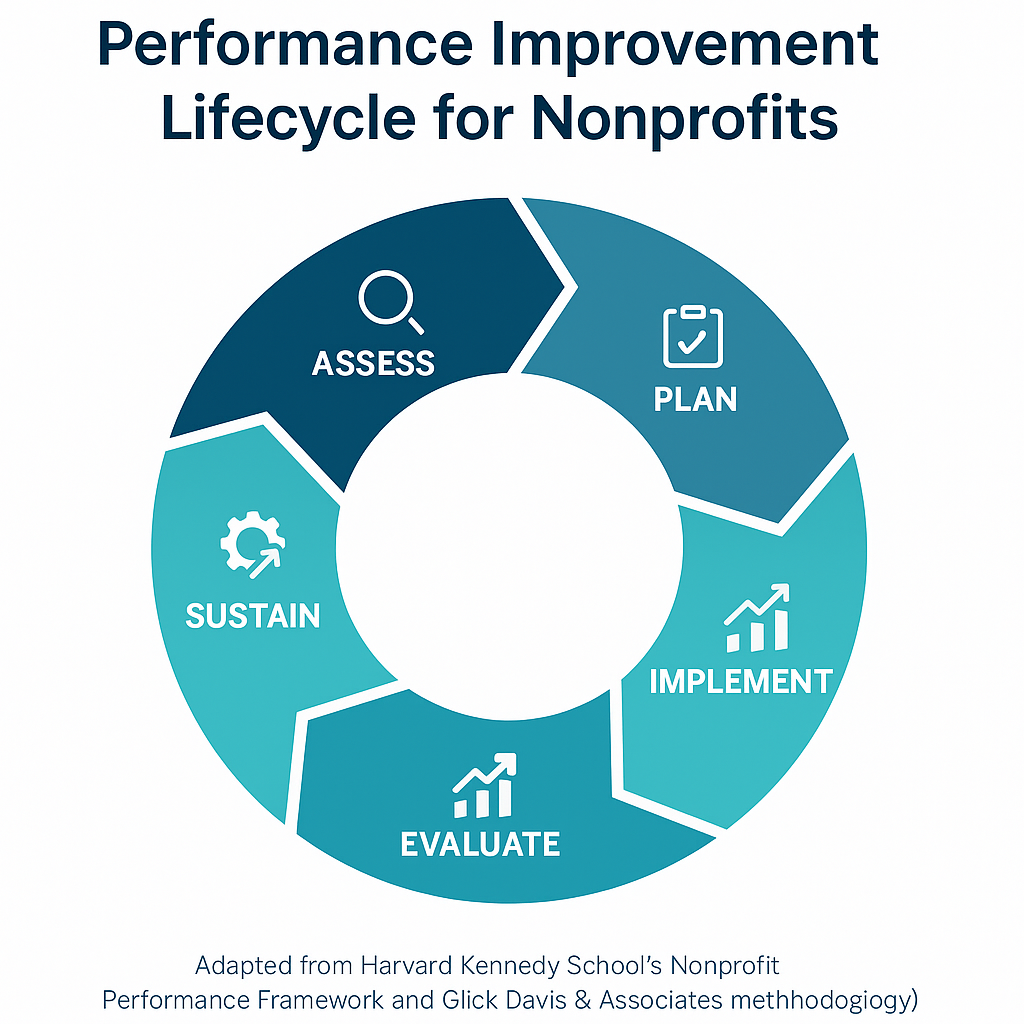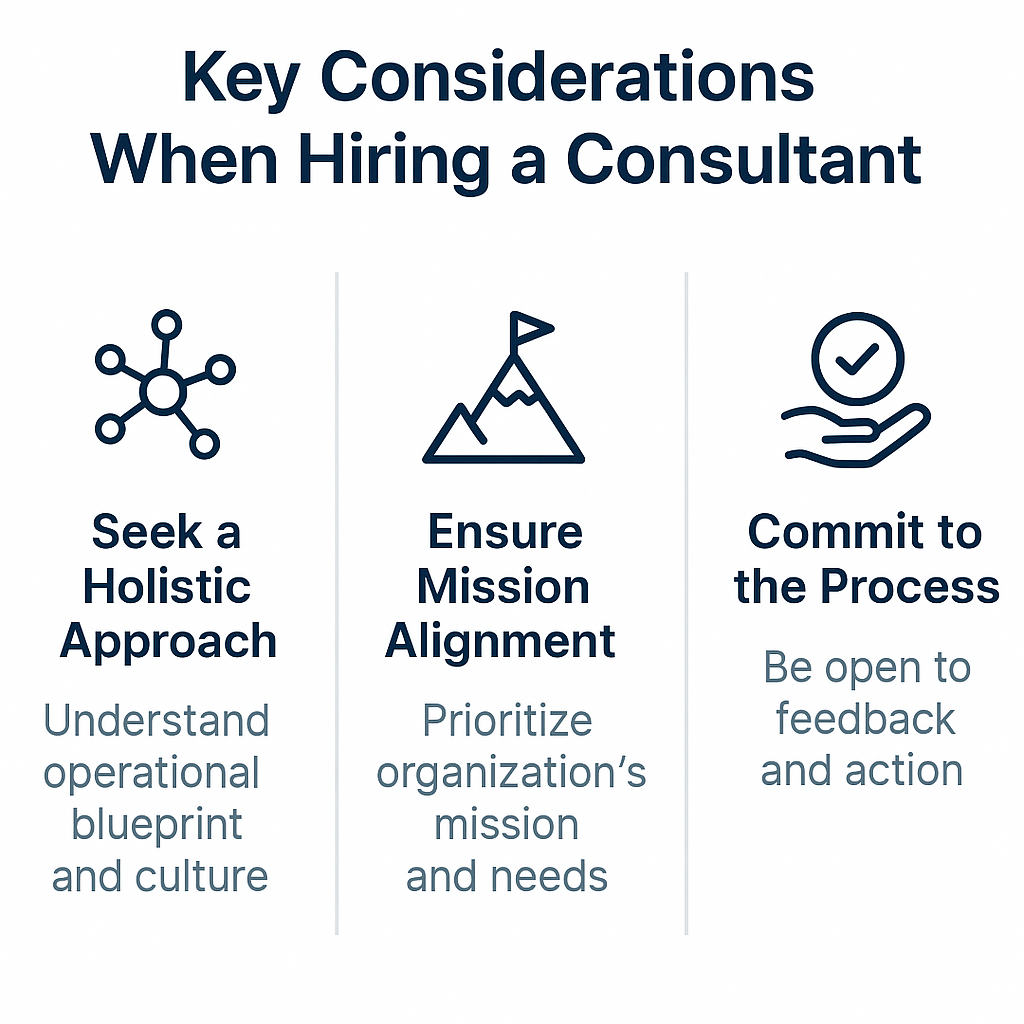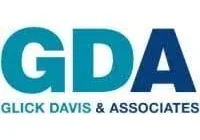In today’s complex and competitive nonprofit landscape, organizations are under constant pressure to demonstrate measurable impact, ensure operational efficiency, and sustain mission-driven growth. While passion fuels these missions, passion alone cannot replace structured management systems or data-driven decision-making. That’s where performance improvement consultants step in.
Nonprofit organizations increasingly rely on performance improvement consultants to evaluate performance, strengthen capacity, and guide transformation strategies that improve long-term outcomes. These consultants combine analytical rigor, organizational assessment tools, and change management techniques to help nonprofits thrive amid funding challenges, evolving community needs, and growing accountability standards.
Table of Content
- The Strategic Role of Performance Improvement Consultants
- Typical Consulting Engagement Process
- Best Practices for Engaging Performance Improvement Consultants
- Key Mechanisms Driving Outcomes
- The Consultant's Process in Action
- Key Considerations When Hiring a Consultant
- Measuring Long-Term Success
- Conclusion
- FAQs
The Strategic Role of Performance Improvement Consultants
Objective Insight and Organizational Clarity
Performance improvement consultants act as objective partners who identify systemic challenges internal teams may overlook. Because they operate outside the organization’s hierarchy, they bring a neutral lens to assess internal processes, culture, and leadership dynamics.
By conducting comprehensive organizational assessments, consultants help pinpoint root causes of inefficiency—- whether it’s communication silos, unclear decision-making structures, or outdated technologies—- and develop a roadmap for improvement grounded in data, not assumptions.
Example: A mid-sized community health nonprofit partnered with a consulting firm to analyze its grant reporting systems. The result? A 30% reduction in administrative time and improved accuracy in impact reporting, freeing staff to focus on direct service delivery.
Integrating Best Practices and Benchmarking
Consultants draw on experience across industries—- healthcare, education, and human services—- to introduce proven best practices into nonprofit operations. This cross-sector insight allows organizations to benchmark against top performers and set realistic, achievable goals.
Whether through performance dashboards, process automation, or leadership training, consultants provide tools that translate into tangible gains in operational efficiency and mission delivery.
Building Capacity and Reducing Burnout
Through hands-on training and leadership development support, consultants help nonprofit teams strengthen organizational capacity. This involves training leaders in decision-making frameworks, coaching teams on data interpretation, and helping staff master tools that support performance monitoring.
Capacity building ensures that once consultants depart, the organization remains self-sufficient— and able to measure, evaluate, and adapt independently.
According to Independent Sector, nonprofits employing structured capacity-building programs report up to 40% greater staff retention and improved cross-functional collaboration.
Typical Consulting Engagement Process
Performance improvement engagements typically unfold through a series of structured phases designed to maximize collaboration and sustainability. Together with nonprofit leadership, consultants develop and execute strategic plans that align mission objectives with measurable outcomes.
1. Comprehensive Organizational Assessment
Consultants begin with a holistic diagnostic review, combining stakeholder interviews, surveys, and financial analyses to gain a 360-degree understanding of the organization. They evaluate program outcomes, leadership alignment, cultural readiness, and technology infrastructure.
These assessments often include benchmarking data to compare performance metrics—- such as fundraising efficiency, program reach, or client satisfaction—- against peer organizations.
2. Strategy and Plan Development
After gathering data, consultants collaborate with nonprofit leadership to translate findings into a targeted improvement plan. This plan outlines key objectives, measurable KPIs, and phased implementation timelines.
The plan might include redesigning workflows, updating financial oversight processes, or establishing new board governance structures. The emphasis remains on achievable, mission-aligned improvements that strengthen the organization’s ability to deliver impact efficiently.
3. Implementation and Coaching
Consultants don’t stop at recommendations—- they guide execution. Through direct support and mentoring, they ensure new systems and habits take hold within the organization.
Common interventions include:
Redesigning reporting and accountability systems
Training department heads in change management
Establishing feedback loops for continuous improvement
By embedding these practices into everyday operations, consultants foster a culture of excellence and adaptability.
4. Measuring Results and Sustaining Change
The final phase focuses on institutionalizing progress. Consultants help nonprofits establish performance dashboards, tracking indicators like program efficiency, fundraising ROI, and community reach.
This data-driven oversight ensures that improvements are measurable and sustainable—- helping leadership demonstrate transparency and impact to funders, boards, and stakeholders.
Best Practices for Engaging Performance Improvement Consultants
1. Define Clear Objectives
Before engaging a consultant, nonprofits should establish what success looks like—- whether it’s improved efficiency, stronger governance, or better impact reporting. Clear objectives ensure both parties remain aligned throughout the engagement.
2. Ensure Mission Alignment
Ensure mission alignment between the consultant’s approach and your organizational goals to preserve focus on beneficiaries. The best consultants don’t impose corporate models; they adapt strategies to the nonprofit context—- preserving values while increasing performance.
3. Promote Organizational Buy-In
Consulting engagements fail when staff perceive them as external audits rather than collaborative partnerships. Involve employees early, communicate transparently, and emphasize shared ownership of the improvement process.
4. Prioritize Capacity Building
The true value of a consultant lies in transferring knowledge. Seek engagements that include mentorship, leadership development, and hands-on training to ensure improvements last well beyond the contract.
Key Mechanisms Driving Outcomes
Mechanism
How It Drives Outcomes
Key Activities & Examples
Specialized Expertise & Insights
Apply sector-specific knowledge to guide strategy and decision-making.
Streamlining grant management, implementing performance dashboards.
Objective, Unbiased Assessment
Identify hidden inefficiencies and root causes without internal bias.
Stakeholder interviews, data analysis, workflow mapping.
Enhanced Operational Efficiency
Reduce waste in time, talent, and resources, enabling focus on mission.
Technology upgrades, process redesign, cross-department collaboration.
Capacity Building & Knowledge Transfer
Develop internal talent to sustain growth and improvement.
Training, mentorship, change-management workshops.
Structured Change Management
Manage transformation with measurable milestones and KPIs.
Project plans, outcome tracking, team accountability systems.
Adapted from Nonprofit Quarterly studies on nonprofit consulting impact (2019–2023).
The Consultant’s Process in Action
The most effective nonprofit consulting services use an iterative improvement cycle grounded in data, collaboration, and accountability.
Assess: Conduct deep organizational assessments to understand the current state.
Plan: Co-design improvement plans with measurable success indicators.
Implement: Deploy solutions with coaching and continuous feedback.
Evaluate: Measure outcomes and refine as needed.
Sustain: Embed new practices into the organization’s DNA.
This approach transforms consulting from a one-time engagement into an ongoing performance partnership.

Based on Glick Davis & Associates methodology and adapted from Harvard Kennedy School – Nonprofit Management Practice Framework.
Key Considerations When Hiring a Consultant
Look for Proven Experience: Seek consultants who specialize in nonprofits.
Demand Transparency: Ensure data methodologies and recommendations are clear and evidence-based.
Evaluate Cultural Fit: Consultants must adapt to your organizational culture, not override it.
Request Case Evidence: Ask for measurable examples of past success in similar organizations.
Prioritize Long-Term Impact: Favor consultants who build capacity rather than dependence.

Measuring Long-Term Success
Performance improvement is not a destination—it’s a journey of continuous learning and adaptation. Nonprofits that sustain improvement efforts are those that view data as an ally, invest in people, and foster transparent communication.
Consultants help establish the frameworks for this ongoing evolution—equipping teams to manage change proactively rather than reactively.
As the social sector evolves, nonprofits that embed performance improvement at the core of their operations stand best positioned to achieve mission sustainability and measurable community impact.
Conclusion
In a sector where passion meets purpose, nonprofit leaders must also master strategy, structure, and performance. Performance improvement consultants serve as strategic allies—helping organizations navigate change, enhance efficiency, and sustain mission impact.
By leveraging external expertise, embracing capacity building, and fostering a culture of accountability, nonprofits can evolve from surviving to thriving—proving that meaningful change begins with measurable improvement.
Found this post useful? Feel free to share.
Let Glick Davis & Associates Help Your Organizations Performance Improvement Needs.
Frequently Asked Questions
They assess organizational effectiveness, identify inefficiencies, and implement structured improvement strategies that enhance operations, leadership, and impact measurement.



